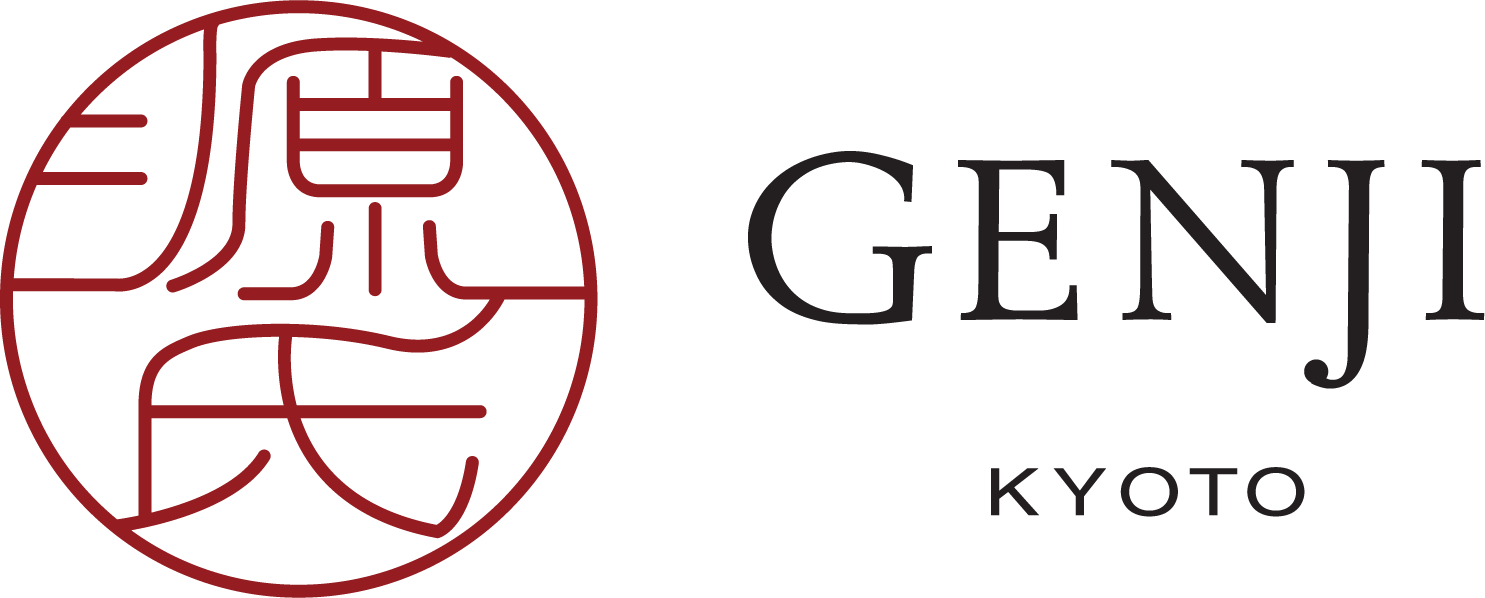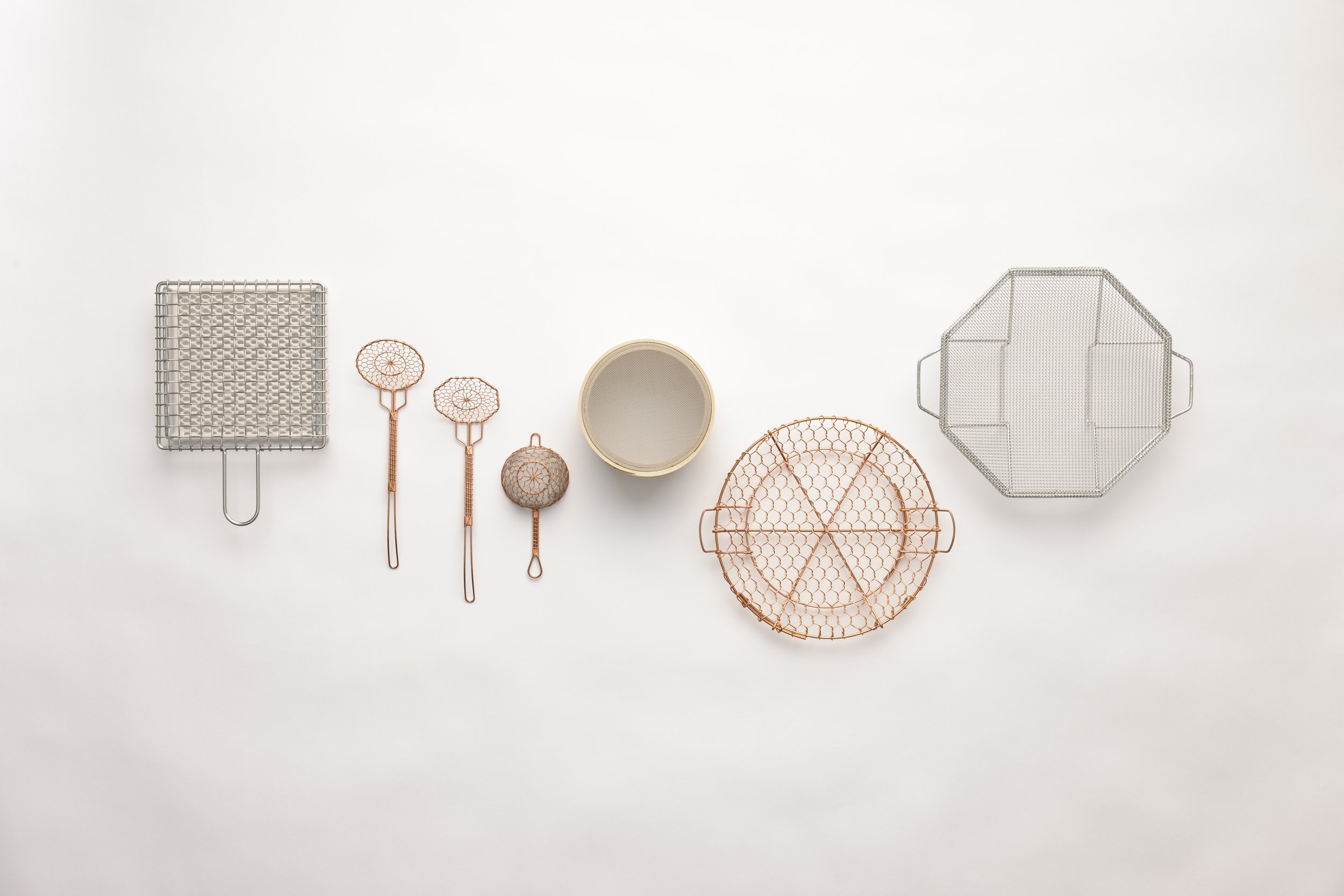Specialty Shopping in Kyoto
Metal woven utensils from Kyoto’s Kana-ami Tsuji Shop (金網つじ) preserve a tradition and never look outdated.
Specialty Shopping - tools, knives, ceramics, incense, fabrics
Being a compact city, Kyoto is great for shopping. One can find almost everything from the department stores - Daimaru, Takashimaya and Kyoto Kawaramachi Garden in Shijō, BAL a little north of Takashimaya, Isetan and Porta in Kyoto Station, and Kawaramachi OPA for young people. Then there are the specialty shops, many of which make products developed from centuries of use and refinement that are great as souvenirs or gifts.
Crafts
POJ Studio
POJ stands for "pieces of Japan", and this shop-gallery-cafe near Kyoto National Museum sells unique craft goods sourced from artisans preserving a tradition while also innovating. You can find furniture, embroidery, cushion covers, incense, tableware and household goods made of ceramics, Washi, bamboo, glass, wood, iron and tatami rush grass. There are even DIY kits for making stools (with wood and rope), and for mending broken ceramics using the Kintsugi method of gold joinery. The Studio offers Kintsugi classes of different durations, as well as a 150-hour apprentice program.
Kana-ami Tsuji Shop 金網つじ
Metal or wire mesh weaving is one of Kyoto’s oldest crafts. This elegant shop near Kōdaiji temple sells utensils, tools and decorative accessories that showcase the beauty of this traditional artisanship. They also take custom orders and hold one-hour workshops in their atelier in the northern part of town.
Kyoto Lacquerware Zohiko 京漆匠 象彦
This lacquerware specialty shop founded in 1661 sells a wide range of Urushi lacquer tableware, trays and decorative boxes. The techniques of shaping wood, painting, applying glaze coatings and sprinkling gold and silver powder have been passed down many generations, starting in the Heian Period when lacquer objects were created for use by the Imperial Court, temples and shrines.
https://en.zohikokyoto.com
Knives
With Japan's history of samurai warriors engaging in almost constant warfare, forging and swordsmithing had always been highly developed. When sword-carrying was abolished in the Meiji period, the art of making katana evolved into the craft of making kitchen knives. To this day the variety and sophistication of Japanese knives remain unrivalled, from the quality of steel to shapes, sharpness, thinness, cutting angles, etc. Here are some of our recommended shops.
Hamono Collection
Staff at this knife shop on the north end of Nishiki market are friendly, knowledgeable and speak good English.
Aritsugu Nishiki Market 有次 錦市場店
This 400-year shop in Nishiki Market is very popular, with a wide range of knives, accessories and some kitchen utensils. They also have a knife repair service.
Yoshisada Hamono 義定
The Shichijō store of this knife company is 10 minutes walk from Genji Kyoto. It mainly caters to locals for their daily use. Apart from chef and kitchen knives, they also sell outdoor and camping knives, and knives for cutting wood, bamboo, or leather.
Yasushige Flower Scissors and Japanese Knives 安重
This shop founded in 1700 specializes in flower scissors. It is near Gojo-dori and Senbon-dori but operates at irregular hours.
Japanese Ceramics
In Japan more than anywhere else, the widest variety of pottery, porcelain and ceramics can be found - from tableware to ornamental urns to sculptures - all crafted through the centuries and in every single prefecture, using local materials and techniques. From the different schools and styles that have emerged come different types of yakimono, or kiln-fired ware, such as Kiyomizu-yaki from Kyoto, or Bizen-yaki from Okayama. As the cradle of the tea ceremony culture as well as an imperial capital for 1,000 years, Kyoto has deep roots of artisanship for many traditional crafts including pottery.
Asahidō Honten 朝日堂
This Asahidō main shop from 1870 is in the Kiyomizudera temple area where pottery shops have a long history. It has a good selection of Kyo-yaki and Kyomizu-yaki vessels by different craftsmen.
Kōdai-ji Nakatani 中谷
This well-stocked cozy shop on the way from Kiyomizudera temple to Kōdaiji temple has tableware from Kyoto as well as other regions.
Mitsuhashi Toho みつはし陶舗
This shop in central Kyoto just south of Sanjō-dori sells daily use tableware to residents and restaurants.
https://mitsuhashitoho.jp/about-eng.html
Kyotōki Hasegawa 京陶器 はせがわ
This friendly family-run store is not a second hand shop (although there is 100 yen section of used ware). But everything here is Showa era old style, with no updating of shape or design to suit contemporary tastes. You will not find design pieces by artists, just daily use ware and accessories. It is 2 blocks south of Kyoto Imperial Palace on Ebisugawa-dori, a street known for its many furniture and home furnishing shops.
https://kyotopi.jp/articles/qyDBy
Sai Sai Utsuwa 器や彩々
This is a very elegant shop-cafe-gallery housed in a Machiya with a Japanese garden. It is in midtown on Omiya-dori a little south of Sanjō-dori, a good spot for taking a coffee break and enjoying the serene atmosphere of this exquisite shop.
https://saisai-utsuwa.com/shop
Robert Yellen Yakimono Gallery
This unique gallery of Japanese ceramics in an old house on Philosopher’s Path has a wide selection of antiques and works by contemporary artists. The owner curator is a ceramics specialist who has lived in Japan since 1984 and has written and lectured widely on the subject.
Incense
Incense in Japan, known as "kō" (香), has a rich history that dates back 1,000 years. Introduced through Buddhism, it is now used not only in religious ceremonies, but in everyday life and appreciated as an art form. There are different types of incense - stick, coiled, powdered - with distinct aromas that come from natural ingredients. Its selection, the method of burning and the experience of scent are all aspects of enjoying incense.
The shops we recommend below not only sell incense but also provide insights into the art of incense appreciation and its cultural significance in Japan.
Shōeidō 松栄堂
This most famous incense shop was founded in 1705 and has been a purveyor to Buddhist temples. It has the highest quality incense, burners and accoutrements.
https://www.shoyeido.co.jp/english/
Yamadamatsu Incense Wood Shop 山田松香木店
This is another premium incense shop with a long history. Founded in 1795, it is a purveyor to Buddhist temples. Apart from selling incense and accessories, it provides an incense wood appraisal service and holds incense making and fragrance appreciation courses and workshops.
Antique Fabrics
Kimono fabric holds a special place in Japan's textile heritage. As the imperial capital for over a millennium, Kyoto has been the center for kimono production, with styles and techniques developed by generations of artisans. It is still home to numerous shops that feature richly textured fabrics that are antique or new.
Chingireya ちんぎれや
This old shop in Gion near Sanjō-dori sells vintage Sakiori fabrics from the Edo and Meiji periods and small objects that can be good as gift items.
http://www.kobijutsu-kyoto.jp/english/memberslist/chingireya.html
Nishijin Okamoto 岡本織物店
Founded in 1909, this shop in the Kiyomizu area specializes in products made with Nishijin silk brocade, the luxurious fabric woven with gold foil and threads. They sell purses and small objects, and can also have customized brocades made to order.
https://okamotoorimono.com/en/
Mimuro 着物みむろ
This is a comprehensive stop for Kimono shopping. This shop to the east of Nijō Castle, between Nijō-dori and Ebisugawa-dori, has a full range of Kimono and Yukata (the simpler cotton version) for all budgets and occasions including weddings.
Aizenkōbō Indigo Workshop あいぜん工房
This specialist of indigo dyeing - an all-natural method involving fermentation of an indigo plant grown only in Japan - is much sought after for their garments, accessories and tapestries said to repel insects and snakes. The unique eggplant hued indigo color has come to be recognized as a “Japanese blue”. The owners are very knowledgeable, friendly and happy to share the history of their artisanship.
http://www.aizenkobo.jp/index.html
Erizen ゑり善
This shop founded in 1584 is on Shijō shopping street and sells refined Kimono and accessories.
Orinasukan Obi (Kimono sash) Fabrics Museum and Shop 織成館
This Machiya in the Nishijin textile district evolved from an artisan’s home and weaving workshop to today’s fabrics museum and shop. It showcases hand-woven textiles, Kimono Obi sashes, and Noh and period costumes that flourished from the Nishijin weaving tradition. There is an active factory on site where artisans use a combination of traditional looms and digital equipment. There are usually staff who can attend in English to give a tour. Appointments can be made for a hand-weaving experience course.








